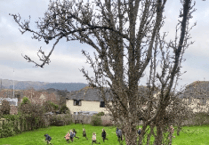AN Exmoor parish council chairman is demanding the Environment Agency explain why it has dropped a requirement for Hinkley Point C nuclear power station to use acoustic fish deterrents (AFDs) in its water intakes in the Bristol Channel.
Anti-nuclear campaigners fear 11 billion fish could be killed during the 60-year lifetime of the £27 billion power station if AFDs were not used.
The Environment Agency has confirmed it has agreed to applications to vary licences for NNB Generation Company (HPC) Ltd, the vehicle through which EDF is building the power plant.
But the decision has been criticised by Katherine Attwater, who chairs Timberscombe Parish Council, is a member of the campaign group Stop Hinkley.
The effect of the changes is to remove a requirement for AFDs and to allow discharges of non-radioactive liquid effluents such as returned cooling water from the turbine condensers, effluents from various plant systems, and treated sewage from staff welfare facilities.
The decision follows a public consultation exercise held earlier this year.
Ms Attwater said in a letter to the Environment Agency: “I am amazed that you have come to this decision given the amount of time, energy, and dedication the public put into responding to your consultation.
“I expect a full explanation of how you arrived at this decision.
“What brought you to this conclusion where you are allowing all the human waste from the largest construction site in Europe, over decades, and the bodies of millions of dead fish for 60 years, to pollute our most significant and precious estuary.
“Without a full explanation I will never consider responding to one of your consultations again.”
An Environment Agency spokesperson said: “It is likely that there will be further opportunities to input into our decision-making for other environmental permits for this site.
“Our next ‘meet the regulator’ meeting will be in the autumn where people can ask us any questions about our regulation of Hinkley Point C.”
A Hinkley Point C spokesperson said “Hinkley Point C is the first power station along the Severn to be built with fish protection measures in place.
"We are working with Natural England, Natural Resources Wales, and the Environment Agency to develop a comprehensive mitigation package to support the removal of an acoustic fish deterrent, which will form part of a full public consultation later this year.”



